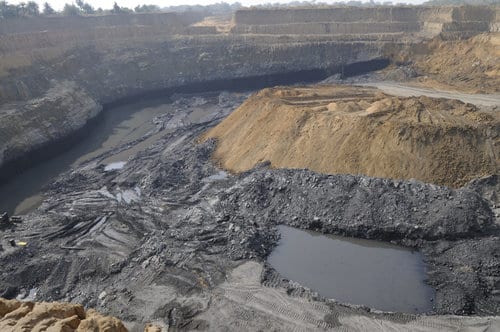
The world’s largest coal miner Coal India has opted to cut prices rather than its ballooning domestic mine production.
Coal India and its customers now have a massive stockpile of 97 million tonnes.
Just over a month ago I and Ashish Fernandes from Greenpeace noted that Coal India’s stockpiles had grown to 84 million tonnes, with the mostly publicly-owned company grudgingly informing the Bombay Stock Exchange (BSE) that this would “create stock management problems, deterioration in quality of coal and coal may catch fire.”
The stockpiles have now grown to 97 million tonnes comprising 58 million tonnes at Coal India’s mines and a further 39 million tonnes at its customers power plants, not that the company has informed the BSE of this. The company’s latest announcement to the BSE cryptically stated only that they have “given up performance incentive” for “supplying higher grades of coal” in order to “improve lifting of coal.”
This decision, Coal India lamented in its announcement to the BSE, “was taken due to fall in international coal prices, improved supply of coal by CIL and there is a sluggishness in coal demand in general and higher grades of coal in particular.”
Back in late January when the massive stockpiles was becoming an issue in the Indian media, the Minister for Power and Coal, Piyush Goyal, insisted that – while he couldn’t direct the government-owned enterprise on pricing – “all I asked them is to get out the stock.”
Despite its best efforts, Coal India couldn’t.
Since January Indian power generators have also been in the ever-tightening grip of drought which has seen a number of water-cooled coal plants shut down.
Early in March the Economic Times cited an anonymous senior official of Coal India who said:
“The power companies are not in a position to take any additional coal and we are being requested, both officially and unofficially, to cut supplies, which has prompted us to scale down production at several other mines apart from the ones where we have stopped production temporarily.”
However, while scaling down production would have been a logical response, Indian Government ministers were transfixed with the idea that the bigger the production number for the March 31 end of financial year, the better everything would be.
Ultimately Coal India reported they produced 536 million tonnes, but now they face a stockpile equivalent to just under a fifth of their annual production.
Faced with a choice of cutting production or prices they have opted for the latter.
In early March an anonymous Coal India executive was quoted in the Indian financial news outlet Livemint stating that cutting the price of coal to boost sales would have “far-reaching unfavourable implications” for the company’s profitability.
Now Coal India has embraced price cuts of between 10-40 per cent until the end of March 2017 in a desperate bid to liquidate combustion-prone stockpiles.
Coal India’s decision to slash prices on its upper grades of coal – which it has also signalled could be extended to lower quality coal – is targeted at further undermining coal imports.
Coal India’s decision is a death knell for Adani’s proposed Carmichael coal mine, which is predicated on the increasingly fanciful notion that the company can profitably export 60 million tonnes of low-grade thermal coal a year into an oversupplied global market dominated by loss-making coal companies.
Coal India’s domestic coal production boom though has come at a terrible cost imposed on farmland, scarce water, forests and innumerable communities.
Coal India is betting that, in taking a financial hit over the next year, domestic coal consumption will inevitably climb ever more upwards as the financial problems of the state-based distribution utilities ease.
Perhaps.
When the boom-time prices prevailed in the global coal market a raft of Indian companies – including Adani, Jindal, Reliance and the ICVL consortium of NTPC, Coal India and others – had grand dreams of buying or building mines from Australia to Indonesia to South Africa and Mozambique.
While the projects – once touted as the next big thing in coal industry circles – have now largely withered on the vine, Coal India has now embraced a business strategy aimed at undermining the very imports major Indian companies once extolled as essential and inevitable.
Bob Burton is the Hobart-based Editor of CoalWire, a weekly bulletin on global coal industry developments. (You can sign up for it here.) His Twitter feed is here.










